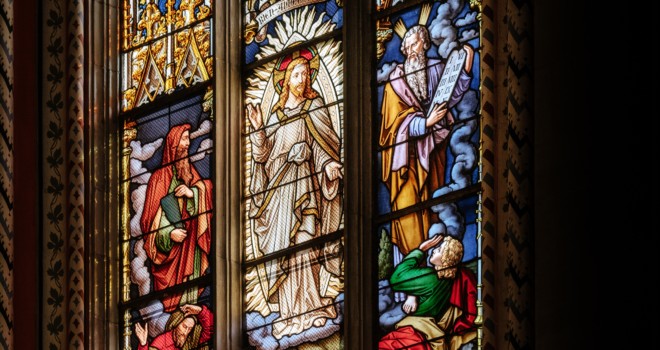The Church continues the reign and mission of Jesus Christ. In today’s world with constant scandals and flawed leadership many are asking how the Church should achieve its mission in a productive and efficient manner. The solution resides in practical and spiritual reform, but, most importantly, the key is located in the Christmas and Easter mysteries; the answer is foolishness.
When the church truly acts as Christ we will be viewed as a people who never give up preaching about the light of the world and the God who is love, even in the midst of a time drenched in darkness and hatred.
Introduction to Christianity, Pope Benedict XVI’s masterpiece, contains many passages that bring theology to the side of the heart. One section highlights the intrinsic connection between Calvary and Christmas in a way that is powerful, beautiful and unique. The theme is not just love, but foolish love. Contact with this divine foolishness is meant to push us towards grateful worship and profound action.
The main challenge of speaking about God today is how we are perceived from the outset:
“It is certainly true that anyone who tries to preach the faith amid people involved in modern life and thought can really feel like a clown, or rather perhaps like someone who, rising from an ancient sarcophagus, walks into the midst of the world today.”
Humanity has been taught for centuries that the route to fulfillment and happiness is paved with doubting ancient principles and debunking religious teachings. The first hurdle we face in speaking with our contemporaries is simply getting them to actually listen to what we have to say, rather than write us off from the very beginning. The recipe to create attentive listeners is love, one of the only topics that relates to every human being who has ever lived.
“No greater love is this, that man may lay down his life for his friends,” (John 15:13). Jesus died on the cross out of a desperate love for the world, but Benedict is much more specific: he died on the cross out of a love that was completely foolish. On that holy tree, Christ portrays the greatest aspect of the human capacity: sacrificial love. In order for unconditional love to be true it must be in some way foolish. There is no logic and no reciprocation necessary when it comes to the deep yearning that God has for his children.
In this way, it is not that strange for the world to see the Christian message as a clown who has entered the room or a mummy who has risen from his grave, but the foolishness of God is wiser than the wisdom of man (1 Corinthians 1:25).
“God does not wait until the guilty come to be reconciled; he goes to meet them and reconciles them. Here we can see the true direction of the Incarnation, of the cross…as the expression of that foolish love of God’s that gives itself away to the point of humiliation in order thus to save man.”
Introduction to Christianity
The crib of Christmas and the wood of Calvary are defined by the fact that they do not demand our attention. He comes as an infant and dies as a criminal because his love is one that gives itself away to the point of physical exhaustion.
The child lying in the manger is totally dependent on his parents; while the carpenter on the Roman execution device hangs lifeless and naked for all to mock. The identity of the Son of God is made most visible in how he enters and leaves this world, he allows us to take advantage of him and overlook him.
This foolish lover notion encapsulates everything there is to know about who God is. A fool who loves intensely is not someone who looks for others to take notice of just how great they are. God does not love us because he has to or because he pities us. His love is given to us because he is wired that way.
Therefore, humanity’s role in response to this love of the Father is not a relentless effort to win his favor. It is, “our becoming totally receptive and letting ourselves be completely taken over by him. Letting God act on us…” Coming to grips with God’s foolish identity liberates us from thinking we have it all figured out and that we can fix everything on our own.
The events surrounding the manger and the crucifix do not
measure out love and foolish love does not count the cost. There is something
very freeing about knowing that someone loves you despite your response, that
all he desires is an intimate and precious proximity with his beloved.
God is the foolish lover. Let us see the tremendous beauty involved in God’s identity revealed at Bethlehem and Jerusalem, and let us be taken over by it. Then we will by instinct love foolishly in return. That will change our Church, and our world.
✠
Photo by Samuel Zeller on Unsplash












